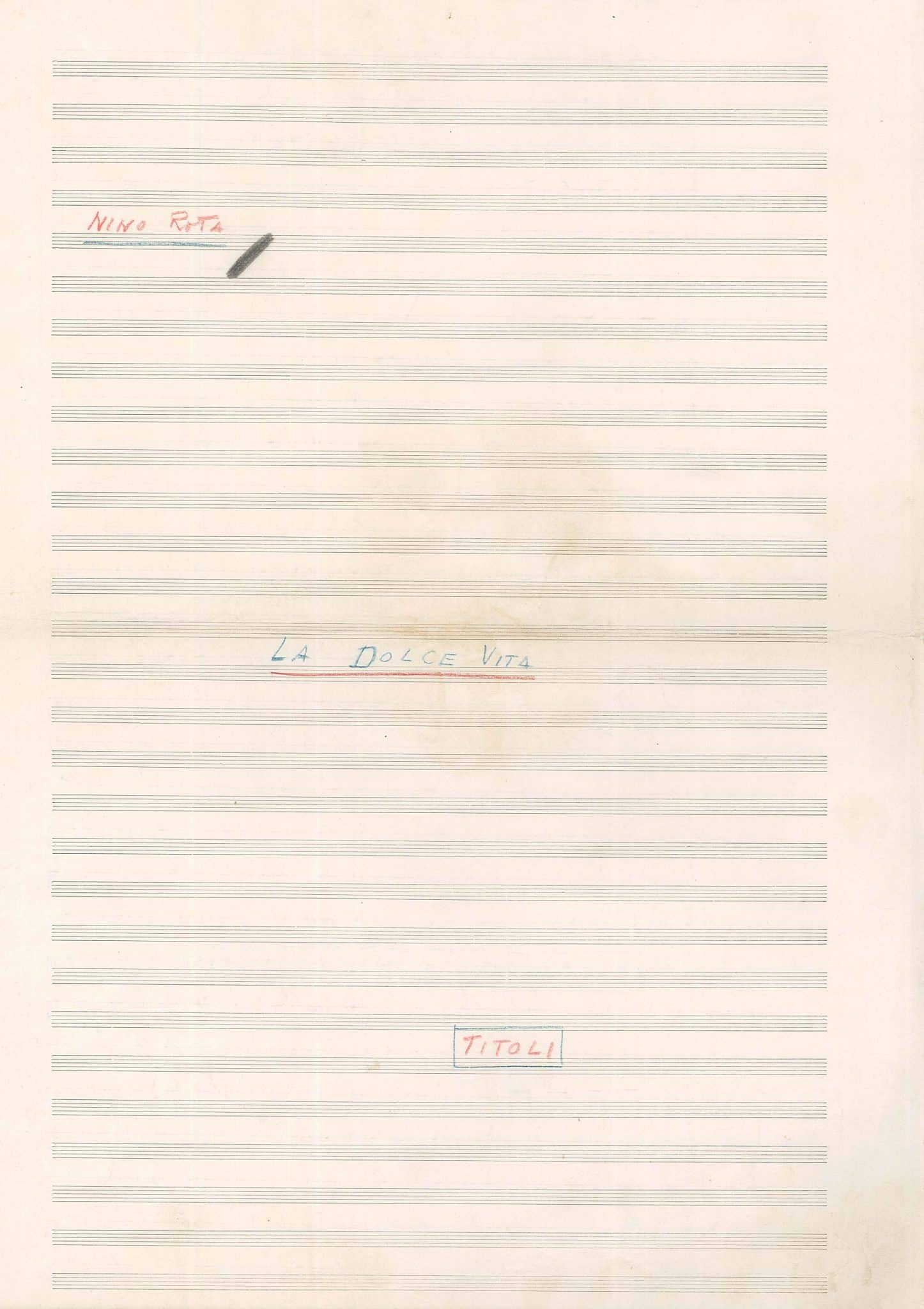
“Among the friends and acquaintances of Federico I tend not to include Nino Rota, because Nino was a rib of Fellini…When Nino passed away, Federico reached me on the phone: “Angelo, Nino has died: without him I feel more lonely, but not lost, because Nino, with his music, left me the best of him, and if my films will continue to live a life of their own and touch people, it is because in their music it’ll be possible to listen to the voice and kindness of Nino.”
From “L’Arpa di Fellini” Angelo Arpa, Edizioni dell’Oleandro, 2001
The words of Father Angelo Arpa, the ‘Jesuit of the Dolce Vita’, are an exciting snapshot of the unique combination of art and friendship between my uncle Federico Fellini and the master Nino Rota. Their first meeting was charming and magical. As my uncle Federico told me: “Dear Franceschina, it was right after the war and we were leaving the headquarters of the production company Lux Film, in Via Po 36, Rome. At the bus stop, I—a thirty-year-old up and coming director—saw Rota, who was already known in Europe for having composed more than 50 soundtracks. I asked him which bus he was waiting for. Rota named a number that did not stop by, but while I was struggling to explain it to him, surprisingly, the bus arrived.”
I have always believed that this anecdote by Fellini contains the synthesis of the bond between the two, a prelude to what would happen for the next quarter of a century: a phenomenon of empathy, irrationality and magic.
Partners in music
From 1959 to 1979—the year of his death—Rota scored all of Fellini’s films, from Sceicco Bianco to the prophetical Prova d’Orchestra (Orchestra Rehearsal), a masterpiece that, if possible, exceeds his previous effort: Il Casanova di Fellini (Fellini’s Casanova). I like to think that Maestro Rota was one of the most significant characters of Italian music in the 20th century. In a time span of forty years his production ranged across a wide spectrum, from absolute music to film scores including Il Padrino (The Godfather), Il Gattopardo (The Leopard), Romeo e Giulietta (Romeo and Juliet), to name a few.
Nino Rota lived within music full-time and uncle Federico, who was struck by music, during an interview said: “Dear Nino, when you write music you are able to listen to the radio and hear a busker playing his concerto at the same time. I, instead, want to be like a dog roaming from one piece of cardboard to another, sniffing them without sticking to any rules. I don’t want to be bound by perfection to any extent. It is for this reason that music saddens me, because it represents perfection.”
I had the honour and the joy of spending time with Nino Rota, and I can confirm that the essence of his persona was his endless availability, matched by an unconditioned melodic generosity. He was gifted with a rare quality: that precious gift that belongs to the sphere of intuition.
To me, the compositions of Maestro Rota will forever represent a sole body of work with the images of uncle Federico’s masterpieces. I firmly believe that Federico and Nino gave life to an unprecedented creative symbiosis, without any predecessors or successors in the history of cinema. Hungarian maestro Miklos Rozsa, one of the most acclaimed soundtrack composers for Hollywood, awarded multiple times with the Oscar for the music of Io Ti Salverò and Ben Hur, once defined Nino Rota as “the prince of scores for the seventh art”.
La Dolce Vita soundtrack
La Dolce Vita, at first, wasn’t supposed to come with any compositions by Rota, since Marcello’s adventures were meant to be scored by well-known popular music.
At the Caracalla party, for instance, the idea was to play one of those famous Brazilian motifs which were all the rage in the Via Veneto nightclubs of the late Fifties. A track that was later replaced by the bersaglieri march theme Silvia dances to, becoming Caracalla’s La Bersagliera in the tracklist.
The only numbers that remained in the film, although rearranged, were Arrivederci Roma, Patricia, Lola, Stormy Weather and the unmistakable Marcia dei Gladiatori.
When discussing the soundtrack of La Dolce Vita, Maestro Rota was keen to point out that: “The need to insert my music in the film happened all of a sudden and in a totally casual way. In the aristocrats sequence, Federico had planned to use Moritat (La Ballata di Mackie Messer) [internationally known as Mack the Knife] the theme from L’Opera da Tre Soldi (The Threepenny Opera) by Brecht-Weill: a famous theme which the licence for was waited until the very last minute. So, the Brecht-Weill motif was replaced in the last two days of works, when the whole soundtrack had already been recorded, featuring a track of mine which included the moods of L’Opera da Tre Soldi and which was made of a series of short phrases, already used for the sequence of Silvia. That theme of mine, once dubbed over the scene, was then adopted again for the sequence of the final orgy.”
La Dolce Vita Sheet Music (Courtesy of CamMusic.com)








